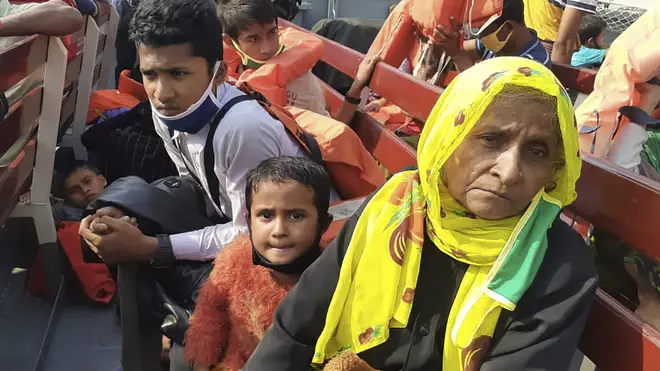
Ben Kentish 10pm - 1am
4 December 2020, 11:44

The never before inhabited island has been designed to take up to 100,000 refugees.
More than 1,500 Rohingya refugees have been sent to an isolated island by authorities in Bangladesh, despite calls by human rights groups to stop the process.
The 1,642 refugees boarded seven Bangladeshi naval vessels in the port of Chittagong for the trip to Bhashan Char, according to an official.

After about a three-hour trip they arrived at the island which was once regularly submerged by monsoon rains but now has flood protection embankments, houses, hospitals and mosques built at a cost of more than 112 million dollars (£83 million) by the Bangladesh navy.
Located 21 miles from the mainland, the island surfaced only 20 years ago and was never inhabited.
The island’s facilities are built to accommodate 100,000 people.
The first arrivals are just a fraction of the million Rohingya Muslims who have fled waves of violent persecution in their native Myanmar and are currently living in crowded, squalid refugee camps in Bangladesh.

About 700,000 Rohingya fled their native home after August 2017, when the military in Buddhist-majority Myanmar began a harsh crackdown on the Muslim group following an attack by insurgents.
The crackdown included rapes, killings and the torching of thousands of homes, and was termed ethnic cleansing by global rights groups and the UN.
Foreign media have not been permitted to visit the island.
Contractors say its infrastructure is like a modern township, with multi-family concrete homes, schools, playgrounds and roads.

International aid agencies and the UN have opposed the relocation since it was first proposed in 2015, expressing fear that a big storm could overwhelm the island and endanger thousands of lives.
The UN said it has not been involved in preparations for the relocation or the selection of refugees and has limited information about the overall plan.
“The United Nations takes this opportunity to highlight its longstanding position that Rohingya refugees must be able to make a free and informed decision about relocating to Bhasan Char based upon relevant, accurate and updated information,” it said.
Amnesty International and Human Rights Watch urged the Bangladesh government to cancel the relocation plan.